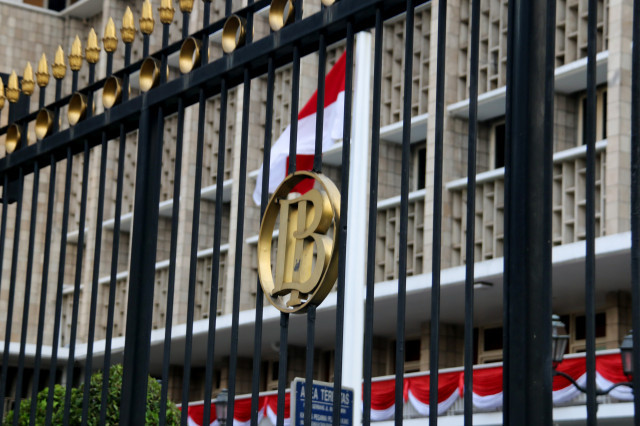Popular Reads
Top Results
Can't find what you're looking for?
View all search resultsPopular Reads
Top Results
Can't find what you're looking for?
View all search resultsBill could push Bank Indonesia into 'dark age'
The draft revision also scraps all existing articles stipulating BI’s independence in monetary policy making, which it was granted in the wake of the Asian financial crisis to help ensure the country had a prudent central bank.
Change text size
Gift Premium Articles
to Anyone
E
xperts and rating agencies have voiced their concerns over the recent draft revision of the Bank Indonesia (BI) Laws, which is feared will undermine the central bank’s independence and prudence amid the economic risks the country faces during the COVID-19 pandemic.
The bill, which was proposed by the House of Representatives’ legislation body, states that the central bank’s mandate will be to manage the rupiah exchange rate and inflation as well as boosting economic growth and helping to ensure sustainable job creation. The prevailing laws mandate BI to manage inflation and the rupiah exchange rate.
The draft revision also scraps all existing articles stipulating BI’s independence in monetary policy making, which it was granted in the wake of the Asian financial crisis to help ensure the country had a prudent central bank. Instead, the draft revision requires the formation of a “monetary council” that will help the government and BI with planning and determining monetary policy.
The council members will be the finance minister, who will also be the leader, another economic minister, the Financial Services Authority (OJK) chairperson and the BI governor and senior deputy governor.
“The monetary council will lead, coordinate and direct monetary policies to be in line with the government’s economic policies,” the bill reads. “The government may add other ministers as advisers to the monetary council.”
According to the 1999 and 2004 BI laws, other parties including the government may not intervene in BI’s tasks to manage the stability of the rupiah through inflation and exchange rate measures, obliging the central bank to oppose any intervention in its policy making and operations.
The bill also stipulates that banking supervision functions are to be returned to BI from the OJK by the end of 2023. The provision comes after reports emerged that President Joko “Jokowi” Widodo had expressed dissatisfaction in the OJK’s performance during the pandemic.
Furthermore, the bill will also provide a legal basis for BI to purchase government bonds through auctions to cover the fiscal deficit and to purchase interest-free government bonds under certain economic conditions.
The government and BI have agreed to a US$40 billion debt monetization scheme to fund the COVID-19 response, which will see the central bank buy government bonds worth $28 billion while bearing the debt burden. However, both have agreed that the scheme will only be implemented for this year.
“The proposed amendments are something of a departure from the normal construct of a monetary board,” Moody’s Investors Service vice president Anushka Shah wrote in an email correspondence with The Jakarta Post on Wednesday.
She added that the inclusion of additional and more varied panelists was not unusual and could lend itself to rigorous and consensus-based policy decisions and add a layer of oversight.
“However, the dominant role proposed for representatives of the Finance Ministry poses the risk that the central bank’s independence will be compromised, and that it will no longer be completely insulated from political interference,” she stressed.
Clauses in the bill also call for a continuation of BI’s role as a provider of temporary financing to the government when revenue shortfalls arise, which may further blur the boundaries between the government and the central bank, and delay an exit from the debt monetization scheme, Shah added.
Representatives of the central bank and the Finance Ministry declined to comment on the draft. Jokowi, however, told a briefing with foreign correspondents on Tuesday that the central bank would remain independent, adding he had no plans to issue an emergency decree to change BI’s role.
Economists expressed concerns the revision would deter foreign investors as they appreciated the central bank’s independence. The rupiah fell by more than 1.5 percent against the United States dollar on Wednesday following reports on the bill. It weakened a further 0.22 percent on Thursday to Rp 14,777.
“The bill will push the central bank into a dark age,” University of Indonesia economist Fithra Faisal told the Post, adding that the practice of government involvement in monetary policy making was obsolete as many countries now had independent central banks. “Foreign investors will surely avoid the country’s financial market if the plan continues because BI may no longer be prudent.”
The current legal framework stipulated in the prevailing BI laws has been credited for the drop in inflation, which fell to 2.7 percent last year from an average of 10.1 percent between 2005 and 2008, as well as prudent exchange-rate management of foreign exchange reserves, which were depleted during the Asian financial crisis and are now at an historic high of $135 billion, Bahana Sekuritas economists wrote in a note Tuesday.
“[The formation of a monetary council] will mean a possible dilution of the central bank’s independence in setting interest rates and pursuing policy goals,” they wrote. “It would also mark a possible return of central banking authority to the Finance Ministry, which had a monetary policy directorate general prior to the Asian financial crisis.”
Bahana, however, said giving BI responsibilities for economic growth and the employment rate was timely and perhaps necessary amid recent developments in the global economy, as recently price levels had become less of a proxy for stability.
For instance, maintaining a high employment rate recently became one of the US Federal Reserves’ monetary policy making objectives.
“With regards to changes in the bank’s mandate, the authorities have yet to publish details on how the central bank should prioritize its various functions and objectives, to prevent clashes if conflicts between these multiple objectives arise,” Moody’s Shah said. “We will consider all of these factors in our overall assessment of institutional strength.”










